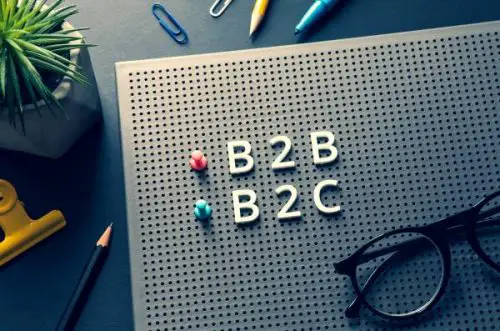Today’s vast majority of businesses operate in the business-to-business (B2B) or business-to-consumer (B2C) space. And while there are similarities between the two, since they may be different products or services for people, there are also crucial differences that any good marketer needs to be aware of.
We suggest the explanations in this article. Keep on reading!

1. B2B Product types are for business purposes
In general, B2B sales involve more complex products and longer sales cycles than B2C sales. B2B buyers are also usually more price sensitive than B2C buyers. It is connected with people taking care of their business interests, service or product usage duration, and outcome.
On the contrary, a single buyer may have the gift of an impulsive purchase or make the decision fast.
Some different products can be sold in a B2B setting from one company to another. Here are some examples:
Goods and services
These can be anything from office supplies to software subscriptions. For example, DevOps outsourcing suggests businesses improve their scalability and data security.
Customized products
Many businesses need products specific to their industry or application. For example, a company might need custom equipment or a software program with specific features.
Consulting services
Businesses often need help with planning and execution and may turn to outside consultants for assistance.
Training services
Many businesses need employees trained in specific areas, such as safety procedures or new software programs. Training services can provide this type of training.
Support services
Once a product or service is up and running, businesses often need help with troubleshooting and software maintenance. Usually, a dedicated development team assists with these tasks by providing related software support services like those mentioned here: https://mlsdev.com/services/dedicated-development-team.
2. A few decision makers in B2B, while B2C usually takes one to decide
Another key difference is that B2B sales often involve multiple decision makers, while B2C sales usually involve just one, the final user. Therefore, effective B2B marketing needs to consider that several people may be interested in the decision-making process.
So to be successful, you’ll need to ensure that you’re reaching out to and engaging all key stakeholders.
Use Content Marketing
Creating targeted content that speaks directly to each individual’s needs and pain points is necessary. Almost 40% of the companies have had their content strategies for the last three years since it brings them profit. By researching and truly understanding your audience, you’ll start material that will resonate with them and help move them along in the buying process.
Gain Trust
It’s also essential to build relationships with each decision-maker. Take the time to get to know them and understand their motivations. You’ll be better positioned to win their business by establishing a connection.
Talk to Interested Potential Customers
Finally, remember to follow up after your initial outreach. It is the practice the B2B leaders use, according to Forbes. Keep the conversation going and continue to provide value. By staying top-of-mind, you increase your chances of being the chosen vendor when it’s time to make a purchase decision.
3. Long-Term Cooperation is Preferred in B2B but is less necessary for B2C
Finally, it’s important to remember that B2B sales usually involve repeat business, while B2C sales are generally one-time transactions. Therefore, building solid relationships with B2B customers is essential to long-term success.
We learned the main differences in this article. By keeping them in mind, you can understand the efforts to sell to businesses or consumers and transform them to benefit your career. Good luck!





